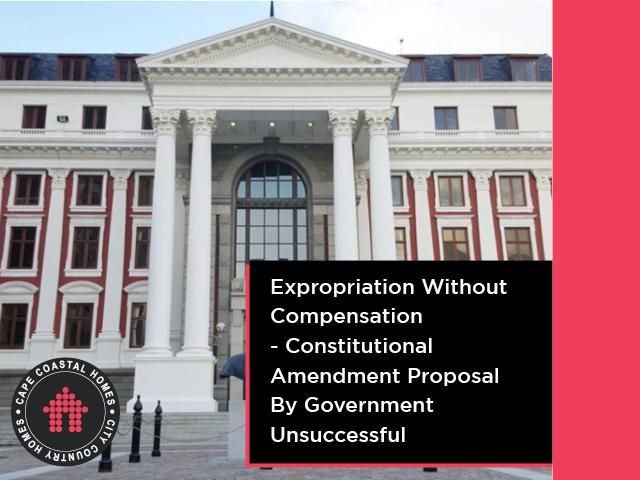Expropriation Without Compensation - Constitutional Amendment Proposal By Government Unsuccessful
Parliament has yesterday voted against the proposed amendment to our Constitution which would have confirmed the government's right to expropriate without compensation. The votes were 204 in favour of the amendment and 145 against. The requisite two thirds majority was therefore not achieved, and the proposed amendment has accordingly failed. The Constitution will therefore remain unchanged. This is good news.
But where does this leave us? Well exactly where we started - just 3 years down the line with lots of money wasted.
Let's recap:
- On 21 December 2018 a draft Expropriation Bill was published for comment. This was intended to become a new Expropriation Act that was in line with our new Constitution.
- Substantial public participation was then engaged in, and the government also commissioned reports and appointed a committee to make recommendations.
- Late in 2019 a draft Bill was published for comment on amending the Constitution, which would expressly allow a Court to authorize expropriation without compensation.
- On 9 October 2020 a second (and slightly amended) draft Expropriation Bill was published again, for comment. The most notable difference between this draft and the previous one, was the proposed types of land that would be earmarked for expropriation without compensation.
According to Miltons Matsemela Attorneys, the Constitution has, since 1994, allowed for expropriation without compensation in limited circumstances and the pending Expropriation Bill of 2020 attempts to give effect to this. This piece of legislation has been running parallel with the constitutional amendment and Miltons Matsemela Attorneys expect that the government will now push this piece of legislation through Parliament with greater urgency. The ANC will only need a simple majority to pass this law as it does not require a constitutional amendment.
What do we have to fear from this?
The answer is not much!
Our new Constitution has since day 1 contemplated expropriation for minimal or zero compensation in limited circumstances. Furthermore, the constitutional requirement that land may only be expropriated for a proper reason, and in terms of a law that applies equally to everyone in South Africa remains. In addition, property can only be expropriated for a public purpose or in the public interest and all relevant circumstances need to be taken into consideration in determining the issue of compensation. The amount of compensation to be paid also needs to balance the public interest and the interests of those who are affected by the expropriation.
Let's hope that this latest development put's paid to further attempts to water down the protection of private property rights as enshrined in our Constitution.
Good News For Investors and Banks
The parliamentary vote is according to STBB Attorneys good news for investors and banks. However, a ruling party that secures a two thirds-majority in the House of Assembly in the 2024 general elections may again push for this amendment. In any event, an amendment to section 25 or other clauses of the Constitution is never "off the table".
The debate may be raised again at any time since the Constitution has sections that allow for amendments, in certain strict circumstances. Bear in mind further that the issue of Rnil compensation is likely to be aired again when the current Expropriation Bill is finalised. (This Bill has been on the cards for a while now and seeks to repeal and replace the current 1973 Expropriation Act. In the current form of the Bill, provision is made for taking into account various factors when land is expropriated for land reform, in line with the Constitution. In so doing, and in very specific circumstances outlined in the Bill, Rnil compensation is foreseen.) The Expropriation Bill is ordinary legislation that is still in the making and as is the norm, will make explicit what is implicit in the Constitution.
This was not a vote for or against land reform.
According to STBB Attorneys, most political parties and South Africans agree by now that land reform is important and necessary, although disagreement remains on what land reform should look like. It remains important to focus on establishing successful land reform programmes within the rule of law and to bring meaningful change to people despite this amendment not going through.
Commentators mention that, although a long three year period has lapsed before the National Assembly finally voted against the amendment to section 25 yesterday, land reform planning did not stagnate in this time. For starters, it had put the discussion on the forefront and in the minds of many South Africans. In this period, a Land Court Bill has been published, to provide for a specialised court to deal with land reform matters. Justice Minister Lamola has also recently repeated talk of a Redistribution Bill and about finalising the Communal Land Rights Act.
These are probably the result of the intense debates around section 25 of the Constitution and are steps to support the promotion of land distribution within the legal framework.
We will keep you updated of the progress by the legislature in this regard.

